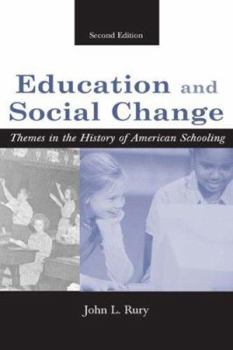Education and Social Change: Themes in the History of American Schooling, Second Edition
In this brief, interpretive history of American schooling, John Rury focuses on the evolving relationship between education and social change. The book considers the impact of social forces, such as... This description may be from another edition of this product.
Format:Paperback
Language:English
ISBN:0805852948
ISBN13:9780805852943
Release Date:September 2004
Publisher:Routledge
Length:284 Pages
Weight:0.60 lbs.
Dimensions:0.7" x 6.1" x 9.0"
Customer Reviews
1 rating
Schools and Society: A Reciprocal Relationship
Published by Thriftbooks.com User , 19 years ago
In Education and Social Change, author John L. Rury introduces readers to the history of American education, focusing on the essential question, "Do schools change society, or does society change the schools?" (1). From the first pages of the book, Rury declares that this is not an either/or question; the influences of schools and society are reciprocal, sometimes moving more noticeably in one direction, but always involving a certain amount of give and take. This back and forth relationship provides fertile ground for Rury's narrative, which opens in the colonial period and continues to the present. Throughout the book, Rury traces the ebb and flow of cultural, social, and human capital, ultimately playing up the "human capital revolution" engendered by the post-WWII economic and educational climate. Along the way, he investigates the impact of industrialization and urbanization, both of which had fundamental and far-reaching consequences for the structure and philosophy of education in the United States. One socio-cultural aspect of schooling I wish Rury had touched on more deliberately is the influence of consumerism on American education. Although he alludes to reforms that sought to make students wise spenders of time and money, Rury does not fully explore the impact of capitalist values on schooling, a surprising move considering his emphasis on human capital. While Rury's narrative is sprinkled with case studies that exemplify his larger themes, the book is essentially an overview of broad time periods and socio-historic movements. Especially when paired with Herbert M. Kliebard's Changing Course, a book that offers detailed, chapter-length case studies, Rury's book is a helpful introductory (or refresher) course for any student of education history. Education and Social Change is far more descriptive than prescriptive, an approach which makes its central issues and ideas all the more applicable to individual readers' experiences. As Rury notes, "At its best, history may offer a point of comparison, to better understand a people's own circumstances, and themselves" (4). For readers looking to situate the contemporary educational climate within a socio-historical context, this account is a good place to start.






